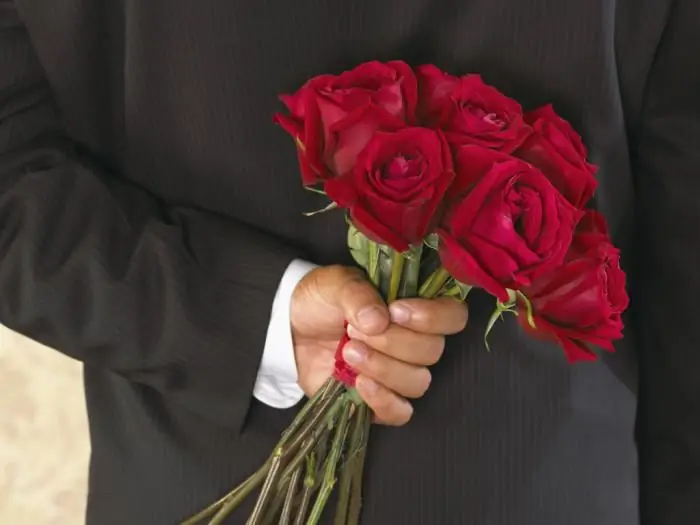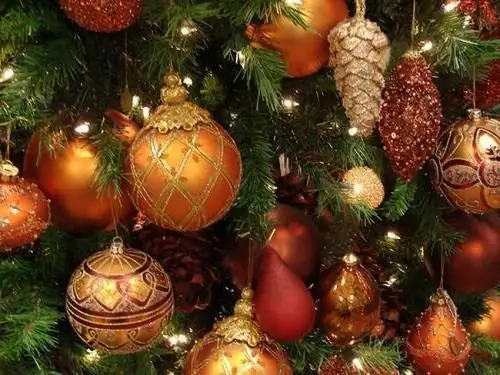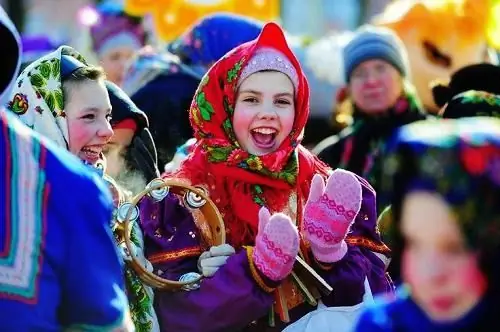2026 Author: Priscilla Miln | miln@babymagazinclub.com. Last modified: 2025-06-01 05:14:29
Winter is a magical time of the year, but very cold. How annoying it is to feel the frosty air every morning, to see snow, hoarfrost, sleeping nature. I want the spring sun, the first greenery, the singing of birds! Our ancestors believed that it was difficult for spring to overcome winter, to drive it away. They helped heat and light come into their own, for this a holiday was needed - Maslenitsa. The date of the celebration falls on the week before Lent. The history of this week-long festivities is interesting and unusual.
Sun
Maslenitsa took its roots from the pagans, our ancient ancestors. They wanted to help the young spring overcome the cold old winter. For this, merry festivities were arranged, which lasted exactly seven days. After all, this number was considered magical! People praised Yarila - the god of the sun and fertility. They imagined him as a young man who resurrected once a year and brought warmth, giving a good harvest.
But over the centuries, everything has changed, Russia adopted Orthodoxy, and from our ancestors we got only Maslenitsa. The date of the event is very suitable - a week beforeGreat Lent, you can eat goodies and start fasting with peace of mind!

Simple name
The name of the holiday was not chosen by chance. To cajole, appease the spring, so that it would quickly give the people the long-awaited warmth. But this is just one version. It is known from other sources that the name comes from the fact that people baked mountains of pancakes and tastefully flavored them with oil, ate them in huge quantities. After all, the date of Maslenitsa is close to fasting, and a week before it, you can no longer eat meat. People were saturated with dairy products, because pancakes with sour cream are a delicacy. During these seven days, it was possible to gain several kilograms in weight. After all, pancakes in every house lay on the table with high pyramids! All kinds of preserves and jams were prepared, honey was served on the table. But in addition to pancakes, the housewives prepared delicious pastries all week, so that an Orthodox person could eat enough before Lent, Maslenitsa helped him in this. The date of the celebration changes every year, but usually falls in the month of March.
Fun
Of course, this holiday was accompanied not only by gluttony. Folk festivals, fisticuffs, mini-performances, and concerts were organized on the squares of the cities. People had fun with all their hearts, attracting spring. The tradition has not sunk into centuries, but has been improved, cultivated. The date of Maslenitsa is now known to every schoolchild, because children are looking forward to this day to celebrate it with friends. In 2016, the holiday lasted from 7 to 13 March. Parents prepare mountains of pancakes, and the guys together eat them right inclass over a cup of tea! Such holidays are only good for children. After all, it unites the team, makes it possible to learn about the life of their ancestors. The class teacher must tell the children about the origin of the holiday, its traditions. The younger generation should know why and when Maslenitsa is celebrated in Russia. The date of the celebration is announced in advance so that everyone has time to prepare for the celebration.

Solar circle
Among the pagans, the circle was considered the most auspicious sign. Therefore, women baked round cakes from flour and water, later they turned into lacy pancakes with milk. They believed that the more pancakes you eat, the sooner the long-awaited spring will come. People worshiped the circle, it symbolized well-being, abundance, prosperity.
Worshiping the sun is one of the most significant pagan ritual actions. Young people made a wooden circle and tied bright ribbons and flowers to it. He was attached to a long pole and paraded through the village. Then the circle was set up on the square and round dances were danced around it, paying tribute to the sun.
Ride around the village on horseback was also a favorite pastime in those early years. It was necessary to make seven circles in order to attract fertility and warmth, to lure spring. Everyone was impatiently waiting for the date of Shrovetide to approach. People wanted a holiday, fun, festivities until the morning and delicious food.

Disservice
All winter the bear sleeps in a cozy den, but only smelling the smell of spring,comes out. People attracted the sun and heat with the help of this forest animal. Of course, no one drove a live bear through the streets. One of the tallest and largest men in the settlement was dressed in a bearskin. Here he was with a cheerful crowd and walked the streets, entertaining passers-by. The bear danced until he dropped, showing everyone that spring had come, he woke up and was glad that today is the date of Maslenitsa.
The joy of people from such a spectacle knew no bounds. They imitated the dance of the awakened bear, treated him to delicious food, danced with a clubfoot friend.
Scary beautiful
The main attribute of this fervent holiday is a scarecrow. The final and most striking moment is the burning of a straw effigy at the stake. They made something similar to the silhouette of a woman from straw, dressed it in old clothes, wrapped it in a bright scarf, painted eyes, cheeks, red lips, and a nose. From the very first day of Maslenitsa, this stuffed animal was carried everywhere with them on a long stick. It personified the holiday itself, winter, cold. Therefore, according to tradition, on the last day of the festivities, it had to be burned. How much joy it brought to the children, they danced around the fire, laughed and rejoiced that winter left them for a whole year.

This tradition has survived to this day. In every city, an effigy of Maslenitsa is burned on the square and the fun continues. Be sure to visit this event, get a lot of new experiences and emotions.
Mini calendar
Every person in our country knows how the date of Maslenitsa is determined. The people prepare in advance for this celebration, because it lasts a wholeweek. And there is no chaos these days, everything must go strictly according to the schedule:
- Monday - opens the holiday week, this day is not at all difficult, but even vice versa. People bake the first pancakes and distribute them to the poor so that they commemorate the dead. In the meantime, the men are finishing preparations for the holiday, setting up booths, tents, swings, benches and tables.
- Tuesday - the second day of the holiday is called Flirting. In the evening, slides are arranged. Everyone is dragging huge sledges and rolling down the ice slide in a noisy whirlwind. There is laughter everywhere, shouts of delight are heard, everyone is ruddy and happy.
- Wednesday is the most “delicious” day of Maslenitsa - Lakomka. Mothers-in-law invite sons-in-law for pancakes with fragrant tea.

Half done
So half of Pancake week has flown by. Now the fun begins:
- Thursday is the most fun and funny day - Wide revelry. The streets are full of entertainment: dancing, singing, fisticuffs, competitions, swings and horse riding.
- Friday - this day is called Mother-in-law's evening. Now the mother-in-law must pay a return visit, the son-in-law is waiting for her at the set table with open arms.
- Saturday - the day has come for the festivities of the girls - Zolovka gatherings. The daughters-in-law went to visit their sister-in-laws, the girls had sincere conversations, had fun and gossiped. The main tradition of this day is that the daughter-in-law should present a good gift to her husband's sister.
- Sunday is the last day, the most cheerful and sad at the same time. So do not wantstop the series of these wonderful holidays. This day is called Forgiveness Sunday. People should ask each other for forgiveness, even the worst enemies on this day can be reconciled forever. After the adoption of the Orthodox faith on this day, it was necessary to come to the temple. There you can ask for forgiveness even from strangers, in response to hearing the phrase: “God will forgive!”

Noisy week
Having fun all week is not easy. After all, people had time not only to eat pancakes and dance, they had to do their work, household chores. After such a noisy and bustling week, people tried to relax, the streets were quiet and peaceful. The date of Maslenitsa and Easter date are not next in the Orthodox calendar. Maslenitsa, although recognized as a holiday, was not equated with Christian ones. The church does not prohibit noisy festivities, but does not encourage them either. After all, this holiday is primordially pagan!
Christianity is a tolerant religion. Therefore, Pancake week has been preserved, but not as a sacred holiday, but as a week of rest. Indeed, in ancient times, all kinds of pagan rituals were performed these days, they revived the earth after hibernation, and even made sacrifices. People believed that the earth needed to be watered with strength so that the harvest was plentiful and good. After all, at that time it was the only source of food. The people worshiped the earth, numerous gods.

Celebrate this fun holiday, have fun from the heart. Let the children know more about this day, because information and knowledge are superfluousdo not exist. On Maslenitsa week, it is customary to visit relatives and friends, to hold magnificent feasts. The abundance of dairy products will benefit the body. Dance, sing, eat pancakes and have fun!
Recommended:
International Women's Day March 8 - a holiday of spring. Traditions, history and features of the celebration of March 8

International Women's Day is already a familiar holiday when men celebrate and pay special attention to their mothers, wives and daughters. However, was everything smooth before? Does this holiday have a different meaning? Information for those interested
Celebration of the New Year: history and traditions. New Year Celebration Ideas

Preparing for the New Year can be done in different ways. Some of us love a quiet family holiday with Russian salad and a Christmas tree decorated with antique toys. Others go to celebrate the New Year in another country. Still others gather a huge company and arrange a noisy celebration. After all, a magical night happens only once a year
What did they do in Russia on Maslenitsa? How was Maslenitsa celebrated in Russia? History of Maslenitsa in Russia

Shrovetide is a holiday that has come to us since ancient times. This article will talk about how they celebrated Maslenitsa in Russia: rituals, customs. A bit of history and much more interesting things can be found in the text below
Football Day: the history of the game and the date of celebration

Football Day is a holiday celebrated not only by professional football players, fans of kicking the ball, but also by people who just like to watch what is happening on the field. How did this game appear and is there a date on the calendar?
How to celebrate Halloween: the history of the holiday, traditions and celebration ideas

Halloween has its roots in the distant past. For more than two thousand years, mankind has been celebrating it

